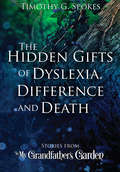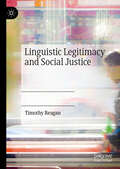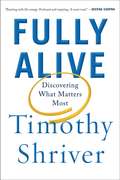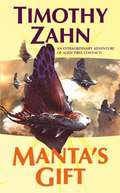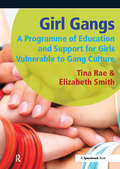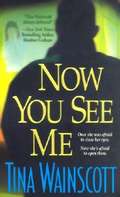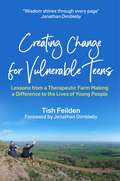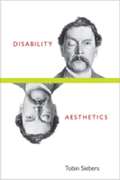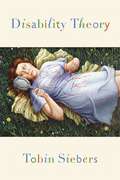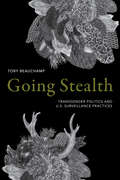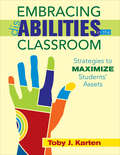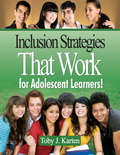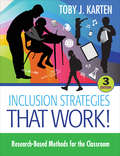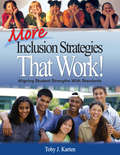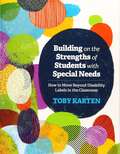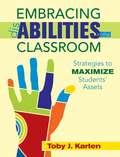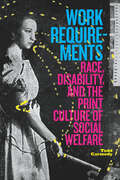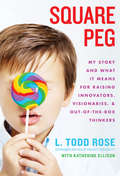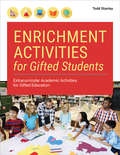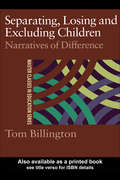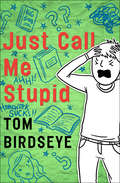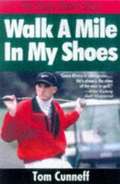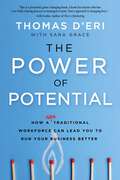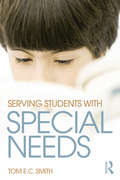- Table View
- List View
The Hidden Gifts of Dyslexia, Difference and Death: Stories from - In My Grandfather's Garden
by Timothy G SpokesCan your difficulties become stepping-stones to a successful future? Can a young boy overcome a serious reading difficulty and achieve beyond all expectations?For a few gruelling years in a Catholic boys’ school, where the Brothers carry a lash under their gowns ready to strike any boy who offends their strict code, Tim struggles with maths and English, and keeps mostly to himself. But he has an observant inner life, with hours spent wandering in the cemetery his grandfather tends, learning about death the leveller and the falsity of social class and wealth.Tim has pitch perfect hearing and a voice like an angel, and is marked out by the Principal Brother to become a priest. Not him! Suffering the tragedy of losing the only three close friends he makes over the years, he experiences living with dyslexia as a cross to bear, until he finds the key to a fearless destiny as a paramedic, trauma and emergency nurse, and academic.The gift of dyslexia has taught Tim to say, “Don’t reach for the sky—hell! Go for the stars. You really can do anything you want.” Wisdom, he says, is found in the strangest places.Among these pages you will experience what Tim learnt within his grandfather’s garden, a strange place to find wisdom—among the head stones and monuments, and where, he says, you can find yesterday’s people.
Linguistic Legitimacy and Social Justice
by Timothy ReaganThis book examines the nature of human language and the ideology of linguistic legitimacy – the common set of beliefs about language differences that leads to the rejection of some language varieties and the valorization of others. It investigates a broad range of case studies of languages and dialects which have for various reasons been considered 'low-status' including: African American English, Spanglish, American Sign Language, Yiddish, Esperanto and other constructed languages, indigenous languages in post-colonial neo-European societies, and Afrikaans and related language issues in South Africa. Further, it discusses the implications of the ideology of linguistic legitimacy for the teaching and learning of foreign languages in the US. Written in a clear and accessible style, this book provides a readable and pedagogically useful tool to help readers comprehend the nature of human language, and the ways in which attitudes about human language can have either positive or negative consequences for communities and their languages. It will be of particular interest to language teachers and teacher educators, as well as students and scholars of applied linguistics, intercultural communication, minority languages and language extinction.
Fully Alive: Discovering What Matters Most
by Timothy ShriverOn a quest for what matters most, Timothy Shriver discovers a radically different, inspiring way of life. At a time when we are all more rudderless than ever, we look for the very best teachers and mentors to guide us. In Fully Alive, an unusual and gripping memoir, Timothy Shriver shows how his teachers have been the world's most forgotten minority: people with intellectual disabilities. In these pages we meet the individuals who helped him come of age and find a deeper and more meaningful way to see the world. Shriver's journey begins close to home, where the quiet legacy of his aunt Rosemary, a Kennedy whose intellectual disability kept her far from the limelight, inspired his family to devote their careers to helping the most vulnerable. He plays alongside the children of Camp Shriver, his mother's revolutionary project, which provided a space for children with intellectual disabilities to play, and years later he gains invaluable wisdom from the incredible athletes he befriends as chairman of the organization it inspired, Special Olympics. Through these experiences and encounters with scholars, spiritual masters, and political icons such as Nelson Mandela, Shriver learns how to find humility and speak openly of vulnerability and faith. Fully Alive is both a moving personal journey and a meditation on some of the greatest wisdom and the greatest contradictions of our society. Is disability to be feared or welcomed, pitied or purged? Shriver argues that we all have different abilities and challenges we should embrace. Here we see how those who appear powerless have turned this seeming shortcoming into a power of their own, and we learn that we are all totally vulnerable and valuable at the same time.
Manta's Gift
by Timothy ZahnI am not a fan of science fiction, but I have to admit that this is a clever, creative and well-crafted novel. My favorite review: What if James Dean were a twin-tailed manta ray swimming in Jupiter's atmosphere? Bestselling Star Wars novelist Zahn (Angelmass) gives us a tale of teen coming-of-age angst set in the herd society of the Qanska, intelligent herbivores who inhabit the equatorial band of the gas giant. Suspecting them to be non-native life, Earth's corporate masters, the Five Hundred, send in a spy to find their hidden star drive. Facing their own disaster, the Qanska agree, hoping to gain a human perspective on the impending exhaustion of their ecology. What neither side can count on is how the person injected into the Qanskan world will react. Matt Raimey, a 22-year-old paralyzed by a skiing accident, agrees to have his brain transplanted into a Qanska fetus. Given a second chance to be mobile, he also unexpectedly gets another chance to mature. Zahn concentrates more on the psychological processes at work than on the technological. Solutions to problems arise from better emotional and intellectual integrity, not simply larger databases. While the author doesn't get as deep into his characters as they do into Jupiter's depths, his portrayal of Matt/Manta is direct and involving. Qanskan life, looking much like marine reef life on Earth, is intriguingly portrayed, even if the biology of the Qanskan problem is suspect. YA readers looking for more than the usual SF action-adventure should be well pleased. (Publisher's Weekly)
Girl Gangs: A Programme of Education and Support for Girls Vulnerable to Gang Culture
by Tina RaeThis vital resource offers an intervention designed to help divert young women from engaging in girl gang culture by providing them with the opportunities to explore alternative options for themselves that ensure a sense of self-worth and belonging in a non-aggressive culture where crime in not integral to their self-definition. This unique resource will give your school access to tools and evidence-based solutions that educate students about the risks of gang culture and provide them with strategies to rationalise and reject anti-social and offending behaviours. This essential resource will enable you to: identify the existence of both girl and boy gangs in school; develop whole school curriculum offering effective teaching and learning about gang issues; adopt a holistic approach to tackling gang culture including parents, community groups and local agencies; secure help for the most vulnerable students; and, prepare staff to deal with the difficulties that arise in tackling these issues.
Now You See Me
by Tina WainscottEVERYTHING SHE FEARS... Olivia was eight years old when she was trapped in the twisted fantasies of a kidnapper. Escaping with her life, the trauma left her blind, and her innocence shattered. But Olivia would escape with something else--a psychic gift that has become her greatest weapon... EVERYTHING SHE SEES... Sixteen years to the day, it's happened again. A little girl named Phaedra has disappeared. Olivia saw it happen. In her private darkness came the visions: the toys... the chloroform... the scissors... the cage... WILL COME TRUE IN THE DARK. Olivia shares the stark fear in the young girl's eyes, and the terrifying fate only Olivia can stop. But to find the fiendish killer and save Phaedra means returning to the terrors of her own past--and opening her eyes to an inescapable new nightmare.
Creating Change for Vulnerable Teens: Lessons from a Therapeutic Farm Making a Difference to the Lives of Young People
by Tish FeildenCreating Change for Vulnerable Teens tells the story of Tish Feilden and Jamie's Farm - a network of therapeutic farms dedicated to transforming the lives of disadvantaged children.Documenting Tish's experiences of working with truly remarkable teens who have faced huge challenges in their lives, the book describes how the farms help young people to thrive academically, socially and emotionally. She shares the approaches they have pioneered, including the critical importance of trust, of looking behind the behaviour and of really connecting with the desires and hopes of young people. If you have an interest in supporting vulnerable children or young people, this book provides a wealth of inspiration and ideas you can use, whatever the setting.
Disability Aesthetics
by Tobin SiebersDisability Aesthetics ambitiously redefines both 'disability' and 'aesthetics,' showing us that disability is central not only to modern art but also to the way we apprehend (and interact with) bodies and buildings. Along the way, Tobin Siebers revisits the beautiful and the sublime, 'degenerate' art and 'disqualified' bodies, culture wars and condemned neighborhoods, the art of Marc Quinn and the fiction of Junot Díaz---and much, much more. Disability Aesthetics is a stunning achievement, a must-read for anyone interested in how to understand the world we half create and half perceive." ---Michael Bérubé, Paterno Family Professor in Literature, Pennsylvania State University. "Rich with examples of the disabled body in both historical and modern art, Tobin Siebers's new book explores how disability problematizes commonly accepted ideas about aesthetics and beauty. For Siebers, disability is not a pejorative condition as much as it is a form of embodied difference. He is as comfortable discussing the Venus de Milo as he is discussing Andy Warhol. Disability Aesthetics is a prescient and much-needed contribution to visual & critical studies." ---Joseph Grigely, Professor of Visual and Critical Studies, The School of the Art Institute of Chicago. Disability Aesthetics is the first attempt to theorize the representation of disability in modern art and visual culture. It claims that the modern in art is perceived as disability, and that disability is evolving into an aesthetic value in itself. It argues that the essential arguments at the heart of the American culture wars in the late twentieth century involved the rejection of disability both by targeting certain artworks as "sick" and by characterizing these artworks as representative of a sick culture. The book also tracks the seminal role of National Socialism in perceiving the powerful connection between modern art and disability. It probes a variety of central aesthetic questions, producing a new understanding of art vandalism, an argument about the centrality of wounded bodies to global communication, and a systematic reading of the use put to aesthetics to justify the oppression of disabled people. In this richly illustrated and accessibly written book, Tobin Siebers masterfully demonstrates the crucial roles that the disabled mind and disabled body have played in the evolution of modern aesthetics, unveiling disability as a unique resource discovered by modern art and then embraced by it as a defining concept. Tobin Siebers is V. L. Parrington Collegiate Professor of English Language and Literature and Art and Design at the University of Michigan. His many books include Disability Theory and The Subject and Other Subjects: On Ethical, Aesthetic, and Political Identity. A volume in the series Corporealities: Discourses of Disability.
Disability Theory
by Tobin Siebers"Disability Theory is just the book we've been waiting for. Clear, cogent, compelling analyses of the tension between the 'social model' of disability and the material details of impairment; of identity politics and unstable identities; of capability rights and human interdependence; of disability and law, disability as masquerade, disability and sexuality, disability and democracy---they're all here, in beautifully crafted and intellectually startling essays. Disability Theory is a field-defining book: and if you're curious about what 'disability' has to do with 'theory,' it's just the book you've been waiting for, too." ---Michael Bérubé, Pennsylvania State University. "Disability Theory is magisterially written, thoroughly researched, and polemically powerful. It will be controversial in a number of areas and will probably ruffle feathers both in disability studies as well as in realms of cultural theory. And that's all to the good." ---Michael Davidson, University of California, San Diego. "Not only is Disability Theory a groundbreaking contribution to disability studies, it is also a bold, ambitious and much needed revision to a number of adjacent and overlapping fields including cultural studies, literary theory, queer theory, and critical race studies. Siebers has written a powerful manifesto that calls theory to account and forces readers to think beyond our comfort zones." ---Helen Deutsch, University of California, Los Angeles. Intelligent, provocative, and challenging,Disability Theory revolutionizes the terrain of theory by providing indisputable evidence of the value and utility that a disability studies perspective can bring to key critical and cultural questions. Tobin Siebers persuasively argues that disability studies transfigures basic assumptions about identity, ideology, language, politics, social oppression, and the body. At the same time, he advances the emerging field of disability studies by putting its core issues into contact with signal thinkers in cultural studies, literary theory, queer theory, gender studies, and critical race theory. Tobin Siebers is V. L. Parrington Collegiate Professor, Professor of English Language and Literature, and Professor of Art and Design at the University of Michigan.
Going Stealth: Transgender Politics and U.S. Surveillance Practices
by Toby BeauchampIn Going Stealth Toby Beauchamp demonstrates how the enforcement of gender conformity is linked to state surveillance practices that identify threats based on racial, gender, national, and ableist categories of difference. Positioning surveillance as central to our understanding of transgender politics, Beauchamp examines a range of issues, from bathroom bills and TSA screening practices to Chelsea Manning's trial, to show how security practices extend into the everyday aspects of our gendered lives. He brings the fields of disability, science and technology, and surveillance studies into conversation with transgender studies to show how the scrutinizing of gender nonconformity is motivated less by explicit transgender identities than by the perceived threat that gender nonconformity poses to the U.S. racial and security state. Beauchamp uses instances of gender surveillance to demonstrate how disciplinary power attempts to produce conformist citizens and regulate difference through discourses of security. At the same time, he contends that greater visibility and recognition for gender nonconformity, while sometimes beneficial, might actually enable the surveillance state to more effectively track, measure, and control trans bodies and identities.
Embracing Disabilities in the Classroom: Strategies to Maximize Students’ Assets
by Toby J. KartenFoster positive experiences by differentiating not only instruction but attitudes too! This practical resource illustrates how educators can effectively promote sensitive, inclusive practices that maximize success for students with disabilities. Karten demonstrates the impact of literature, self-advocacy, role playing, and behavioral, academic, and social interventions on students’ growth. The numerous tables, rubrics, instructional guidelines, charts, and content-rich interdisciplinary lessons help readers: - Determine effective strategies for differentiating instruction for specific disabilities - Modify lessons and curriculum appropriately in the content areas - Encourage students to become active participants in learning - Increase disability awareness and foster inclusive mind-sets in students, colleagues, and families
Inclusion Strategies That Work for Adolescent Learners!
by Toby J. KartenBacked by the author’s three decades of experience, this reader-friendly guidebook provides teachers with a practical approach for creating a successful inclusive secondary classroom. Toby J. Karten helps teachers use a variety of strategies, including differentiated instruction, universal design for learning, brain-based learning, RTI, and evidence-based practice. With helpful forms, activities, graphic organizers, and quotations throughout, this resource: <p><p> Outlines the theoretical background for creating an inclusive classroom environment <p> Describes the psychosocial, cognitive, physical, and moral development of adolescents and how they affect teaching practice <p> Provides research-based practices to maximize and honor learners’ potentials and strengths
Inclusion Strategies That Work!: Research-Based Methods for the Classroom
by Toby J. KartenThe go-to book for including ALL learners in educational success! Teaching students with diverse needs require educators to employ empathy, responsiveness, and patience. This book has long been the indispensable resource for K-12 teachers as they confidently form lesson plans and strategies for inclusion. In this new edition, Toby J. Karten’s data-driven methods are updated with the latest research and policy developments. The book’s content includes: Updated information on ADA, IDEA, writing IEPs, transitional services, classifications, RTI, metacognitive strategies, and links to the Common Core Tips for working with families and making them an integral part of the inclusive team An overview of special education legislative terminology Interactive online forms for planning, documentation, and collaboration
Inclusion Strategies That Work!: Research-Based Methods for the Classroom
by Toby J. KartenThe go-to book for including ALL learners in educational success! Teaching students with diverse needs require educators to employ empathy, responsiveness, and patience. This book has long been the indispensable resource for K-12 teachers as they confidently form lesson plans and strategies for inclusion. In this new edition, Toby J. Karten’s data-driven methods are updated with the latest research and policy developments. The book’s content includes: Updated information on ADA, IDEA, writing IEPs, transitional services, classifications, RTI, metacognitive strategies, and links to the Common Core Tips for working with families and making them an integral part of the inclusive team An overview of special education legislative terminology Interactive online forms for planning, documentation, and collaboration
More Inclusion Strategies That Work!: Aligning Student Strengths With Standards
by Toby J. KartenProvides research-based strategies for identifying and meeting the needs of students with disabilities, links best inclusive practices with content-specific curriculum, and helps educators fulfill IDEA 2004 requirements.
Building on the Strengths of Students with Special Needs: How to Move Beyond Disability Labels in the Classroom
by Toby KartenAs a must-have reference for busy teachers with little special education training, this book supplies classroom-tested instructional strategies that address the characteristics of and challenges faced by students with special needs. Dozens of differentiated strategies target teachers’ anxieties and provide responsive interventions that can be used to address specifics of IEPs and learning plans. <p><p>With Building on the Strengths of Students with Special Needs, special education expert Toby Karten focuses on specific disabilities and inclusive curriculum scenarios for learners in K–12 environments. She offers valuable advice on how to prevent labels from capping student potential and encouragement to help teachers continually improve learner outcomes. <p><p>By highlighting more than a dozen disability labels, this resource walks teachers through the process of reinforcing, motivating, scaffolding, and planning for instruction that targets learners of all ability levels. Included are details relevant to each disability: <p>•Possible Causes <p>•Characteristics and Strengths <p>•Classroom Implications <p>•Inclusion Strategies <p><p>Typical instruction needs to match the diversity of atypical learners without viewing any disability as a barrier that impedes student achievement. Teachers must not only learn how to differentiate their approach and target specific student strengths but also maintain a positive attitude and belief that all students are capable of achieving self-efficacy.
Embracing Disabilities in the Classroom: Strategies to Maximize Students? Assets
by Toby KartenHow we treat others often influences how individuals feel about themselves. This book illustrates how educators can effectively promote sensitive, inclusive classroom practices that maximize success for students with disabilities. Embracing Disabilities in the Classroom provides content-rich interdisciplinary lessons accompanied by behavioral, academic, and social interventions that capitalize on student strengths. Inclusion expert Toby J. Karten demonstrates the impact of literature, self-advocacy, role playing, and strategic interventions on students' growth and achievement. The numerous lessons, tables, rubrics, instructional guidelines, and charts help readers: * Determine effective strategies for differentiating instruction for specific disabilities * Modify lessons and curriculum appropriately in the content areas * Encourage students to become active participants in learning * Increase disability awareness and foster inclusive mind-sets in students, colleagues, and families This practical resource provides special education and general education teachers, principals, and teacher leaders with both effective instructional strategies for curriculum delivery and responsive approaches to promoting positive attitudes toward disabilities. Given appropriate support and an accepting environment, all students are able to achieve, thrive, and succeed in school and in life!
Work Requirements: Race, Disability, and the Print Culture of Social Welfare
by Todd CarmodyThroughout the history of the United States, work-based social welfare practices have served to affirm the moral value of work. In the late nineteenth century this representational project came to be mediated by the printed word with the emergence of industrial print technologies, the expansion of literacy, and the rise of professionalization. In Work Requirements Todd Carmody asks how work, even the most debasing or unproductive labor, came to be seen as inherently meaningful during this era. He explores how the print culture of social welfare—produced by public administrators, by economic planners, by social scientists, and in literature and the arts—tasked people on the social and economic margins, specifically racial minorities, incarcerated people, and people with disabilities, with shoring up the fundamental dignity of work as such. He also outlines how disability itself became a tool of social discipline, defined by bureaucratized institutions as the inability to work. By interrogating the representational effort necessary to make work seem inherently meaningful, Carmody ultimately reveals a forgotten history of competing efforts to think social belonging beyond or even without work.
Square Peg: My Story and What It Means for Raising Innovators, Visionaries, and Out-of-the-Box Thinkers
by Todd RoseIn the seventh grade, Todd Rose was suspended-not for the first time-for throwing six stink bombs at the blackboard, where his art teacher stood with his back to the class. At eighteen, he was a high school dropout, stocking shelves at a department store for $4.25 an hour. Today, Rose is a faculty member at the Harvard Graduate School of Education.Square Peg illuminates the struggles of millions of bright young children--and their frustrated parents and teachers--who are stuck in a one-size-fits-all school system that fails to approach the student as an individual. Rose shares his own incredible journey from troubled childhood to Harvard, seamlessly integrating cutting-edge research in neuroscience and psychology along with advances in the field of education, to ultimately provide a roadmap for parents and teachers of kids who are the casualties of America's antiquated school system.With a distinguished blend of humor, humility, and practical advice for nurturing children who are a poor fit in conventional schools, Square Peg is a game-changing manifesto that provides groundbreaking insight into how we can get the most out of all the students in our classrooms, and why today's dropouts could be tomorrow's innovators.
Enrichment Activities for Gifted Students: Extracurricular Academic Activities for Gifted Education
by Todd StanleyEnrichment Activities for Gifted Students outlines a variety of extracurricular academic activities and programming options for gifted student talent development. This book:Includes strategies for educators to develop enrichment programs that fit the needs of their students.Provides numerous examples of nationally-recognized and easy-to-implement programs and competitions.Helps promote students' academic growth.Categorizes options by subject area, including math, science, language arts, and social studies.Categorizes options by skill type, including creative thinking and leadership.Enrichment Activities for Gifted Students provides everything busy educators need to know about offering, funding, and supporting enrichment activities and programs that develop students' content knowledge and expertise, build valuable real-world skills, and extend learning beyond the walls of the classroom.
Separating, Losing and Excluding Children: Narratives of Difference
by Tom BillingtonThere has been an outpouring of children from schools over the last few years. The reasons for their exclusion from schools include: learning difficulties, behavioural problems or physical disability. Other reasons that are not dependent on a 'deficit' model of the children relate to Conservative-led initiatives involving school league tables, greater accountability, inspections, etc. Whatever the reasons, the new government are committed to reducing the number of children who are forced out of mainstream schooling. The author addresses the key issues and relates them to the main theory/literature in the area. He 'unpicks' the major theories and applies them to possible ways of working with children in the classroom. Four case studies are used in order to make these proposed ways of working more accessible. As with other books in the series, exercises, readings and questions are set throughout.
Just Call Me Stupid
by Tom BirdseyeFifth-grader Patrick can&’t read, but when the new girl next door encourages him to overcome his fears and try, he starts believing he isn&’t so stupid after allPatrick Lowe has always loved imagining his own fantastic stories of brave knights and dragons. Unfortunately, every time he tries to read, his father&’s voice pops up in his head telling him he&’s stupid, and the words on the page suddenly become too blurry to see. By his fifth grade year, Patrick has stopped trying to read altogether. He doesn&’t think he needs any friends, but his new next-door neighbor Celina just won&’t leave him alone. As Patrick and Celina slowly become friends, Celina starts reading The Sword and the Stone to him every afternoon. Patrick is entranced by this mythical world of white knights and vicious beasts, magic and adventure, but no matter how hard he tries, he himself still cannot read. But when Celina betrays his trust, Patrick finds himself betting to the class bully that he can read a story to the entire school. Patrick is determined to show everyone that he&’s no dummy, but can he get past his own fears and finally learn to read?
Walk a Mile in My Shoes
by Tom CunneffRookie golfer Casey Martin, who suffers from a debilitating disorder that causes him to become easily fatigued, has been in the headlines lately with his lawsuit against the PGA. This book tells of the obstacles that Martin has had to overcome in his lifetime to get to where he is now.
The Power of Potential: How a Nontraditional Workforce Can Lead You to Run Your Business Better
by Tom D'Eri&“This is a powerful, game-changing book, a book for anyone who has ever built a hiring process or managed a team. Tom's approach is changing lives.&”-Seth Godin, Author of This is MarketingRising Tide Car Wash in Parkland, Florida, isn&’t average in any way. When Tom D&’Eri and his father John bought the location in 2013, it was struggling. Now it&’s one of the highest-volume washes in Florida. Its employee retention rate is five times that of its competitors. It has spun off into two additional locations that have been immediately successful, and the business is absurdly profitable. Over 500,000 cars a year drive away sparkling. Rising Tide has become a media darling, featured on The Today Show, NBC Nightly News, and in magazines including Entrepreneur, National Geographic, and Forbes.Why so much hoopla over a successful car wash? Roughly 80 percent of Rising Tide&’s workforce consists of people with autism. While part of the success comes from their mission, that doesn&’t explain the excellence that permeates every aspect of the business: service quality, customer experience, teamwork, management, and organizational design. Put any aspect of the D&’Eris&’ operation against other businesses, and you&’ll find they have the edge.The Power of Potential tells the inspiring, surprising reason why: The wash&’s excellence isn&’t in spite of their unusual workforce, but because of it. Thanks to their unconventional staff, the Rising Tide team was able to discover and correct common problems that typically fly under the radar in businesses. By spotting and correcting these hidden problems, any business, with any kind of workers, can achieve unexpected wins and leave average behind. The common problems include:You Hire Based on InterviewsYou Think Great Talent Is the Secret to a Great BusinessYour Managers Are &“Good Enough&”You Fire Your Worst EmployeesTo our surprise, solving the four problems changed who we were as a company. The result was four unexpected wins that added up to a culture of excellence—but leadership is needed to reinforce what matters.Every Employee Feels SafeAccountability is a Tool for GrowthYour Work Has PurposeCustomers Love Their Experience
Serving Students with Special Needs: A Practical Guide for Administrators
by Tom E. SmithServing Students with Special Needs provides administrators with essential knowledge about the requirements for special education services, as well as practical steps to ensure legal compliance and appropriate services for students with special needs. Each chapter includes basic information followed by specific suggestions or steps. This brief, easily applied, and highly practical guide covers: Instruction, including differentiated instruction and universal design for learning Assessment, including accommodations and modifications and response to intervention (RTI) Developing multi-tiered systems of support (MTSS) Student progress monitoring and using large data sets to inform decision making Mediation, due process hearings, and litigation Systems management and positive behavioral intervention supports (PBIS) Scenarios are presented along with suggested responses and solutions. Serving Students with Special Needs has been specifically developed to provide administrators with practical suggestions to quickly and effectively implement appropriate special education practices.
